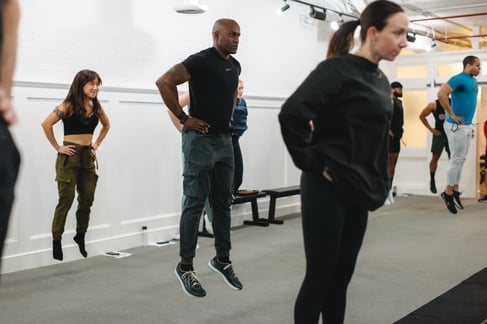5 Reasons Why Building a Running Base Matters
June 5, 2023
At the time of publishing this blog, the 2023 NYC Marathon is 23 weeks away. The average marathon training cycle is 16 weeks long, so why are we talking about NYC now?

Because in actuality, the next few weeks are the most important part of your training, and could make or break what week 10-16 looks (and feels) like. What you do now sets the tone for how smoothly your training will go. This is base building season.
WHY BASE BUILDING MATTERS
1. Preempt Injury
While online 'couch to marathon' training plans insinuate that going from 0 to 100 is possible, we can all probably agree that it doesn't sound particularly smart. The biggest risk to your body when attempting an endurance race is increasing stress on your body too quickly; in other words, adding too much mileage too soon. Your base build is meant to mitigate that risk by slowly and comfortably increasing your weekly mileage in a way that gives your body time to adjust. Keep in mind that the feedback loop of poor base -> injury can be extremely delayed; often these injuries don't pop up until you are in the heaviest weeks of training (4-6 weeks out from the marathon) and that is an extremely scary time to start regretting what you did or didn't do 3 months ago.
For most 16 week plans, you should be at 15-20 miles/week (with a long run distance of 8-10 miles) as you enter week one. That doesn't mean you should just be capable of running that much; it means your body should be comfortable there.

2. Build Your Aerobic Base
As you build your body's tolerance to the pounding and stress of running, you also build your heart and lung's capacity to tolerate aerobic exercise. This is the time to train your cardiovascular system to efficiently convert oxygen to energy, regulate heart rate and blood flow, and to do it all over extended periods of time.
Your runs should be slow and steady to build your aerobic base. You should feel like you could keep going at the end of a run, not that you'll be wrecked for several days. Think of this as the difference between shocking your body and slowly acclimating your body to its new normal.
3. Acclimate to a Routine
On that note, this is also the time to start creating the lifestyle routines that you will use to help you mentally get through a long training cycle. Consider which days of the week are best for longer vs. shorter runs, how much time you need before and after to properly prep and recover from your workouts, and when you plan to fit in your cross training. Check out run groups in the city, and see if any are offering marathon training programs. Last year, Nike offered a weekly long run series that coincided with the 2023 NYC Marathon.

4. Learn Your Training Intensities
Your base building runs should all be at an easy, conversational pace (see 2. Build Your Aerobic Base), but that doesn't mean you don't need to worry about training intensities. In fact, right now is when you should have the most mental capacity to tune into your body and start learning to read its signals. An easy way is to read up on heart rate zones to start understanding how hard your body is working on any given run. Another is to start using the journal feature in your tracking app to denote how hard any given run felt.
5. Optimize Strength
There's no way to dance around this: Running sucks out your strength gains. Running optimizes your body to carry as little load as necessary in order to go fast and long. Marathon training will also take up more and more of your time, and you may struggle to find time to fit strength in as you reach the latter half of your training. That's why now is the best time to build muscle; muscle to protect you from injury and breakdown later on. Even as you are building your aerobic base, your energy during this phase should go towards lifting heavy and consistently rather than hard running workouts.

GETTING STARTED WITH YOUR BASE TRAINING RUNNING PLAN
If this is your first marathon, congratulations! It takes courage to sign up for a race, let alone a marathon, and while the road is a long one, it is an incredibly rewarding and gratifying one. There are a ton of great resources online (starting with our blog!) for understanding how to care for yourself through it, but at MOTIVNY we highly recommend having a conversation with a physical therapist to jump start the learning process. Tap below to set up an appointment today.

Jessica Hartnett
Doctor of Physical Therapist and self-proclaimed adrenaline junkie.
jess@motivny.com